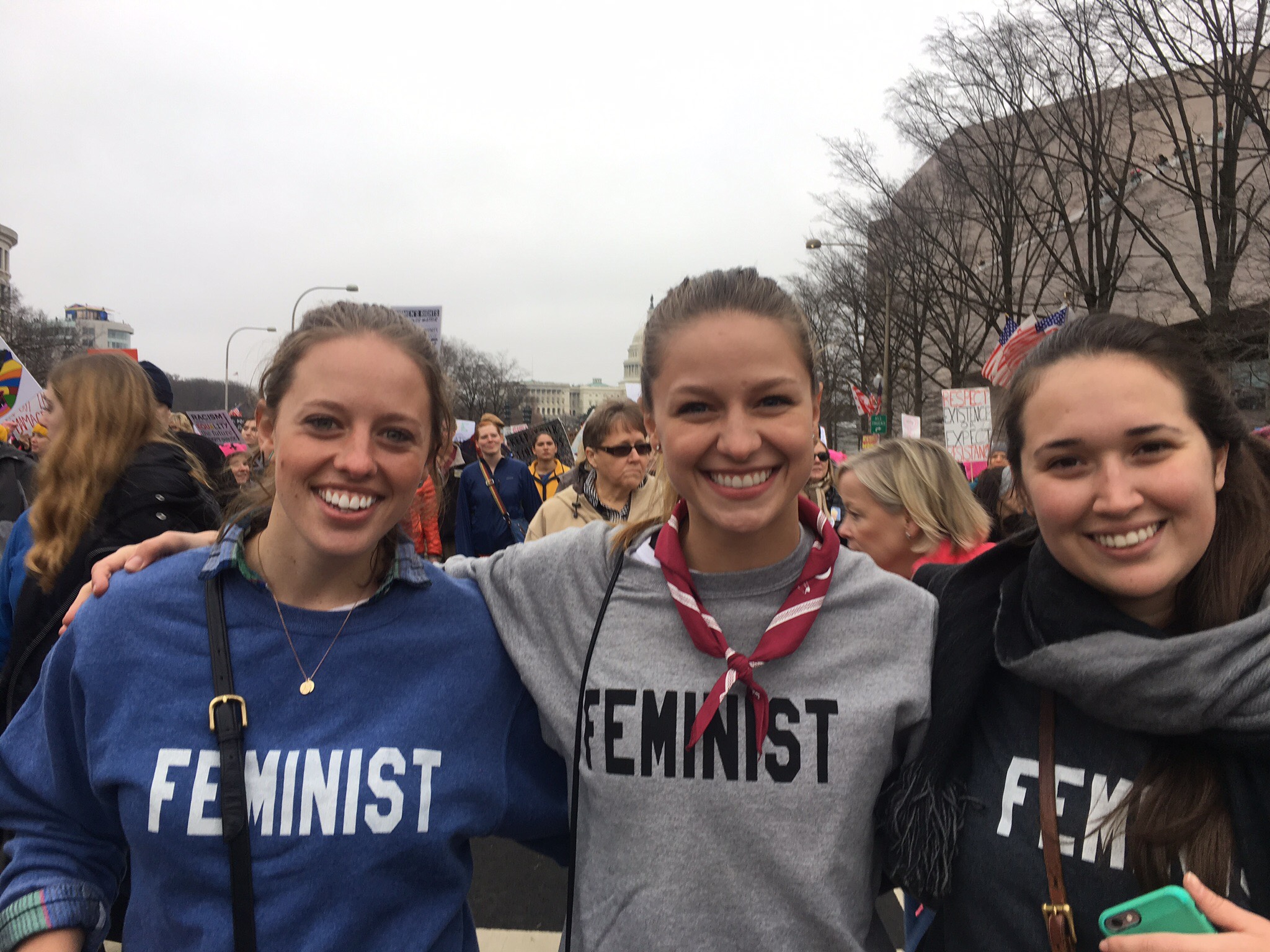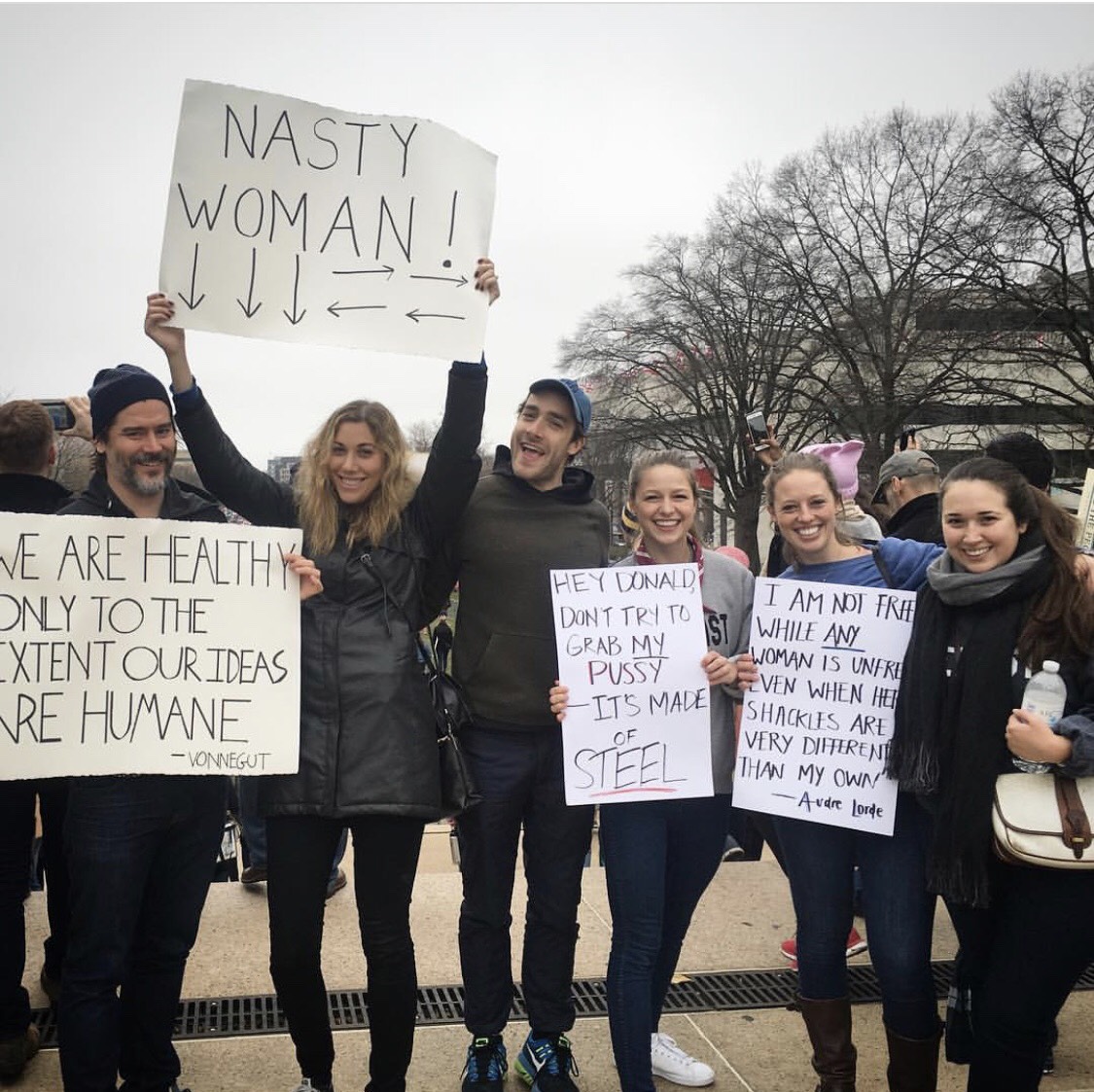
I scrawled the words with a big, fat permanent marker — “HEY DONALD, DON’T TRY TO GRAB MY P—SSY — IT’S MADE OF STEEL” — with equal parts trepidation and enthusiasm. I was participating in the Women’s March on Washington, D.C. on Jan. 21, 2017 with an amazing group of social justice warriors that included my younger sister, my best girlfriend and my manager, who exclaimed the second I finished creating my sign, “You have to post a picture of that sign on Instagram.” I’m not proud to admit that I balked. I rationalized that there would surely be plenty of explicit and loud signs already, so just in case, I wrote an alternate (and much tamer) reference to Rebecca Solnit, “HOPE IS DEFIANT,” on the backside of the poster. It worried me that the first version might be too vulgar for the young girls who are influenced by my role on Supergirl, and for the first 45 minutes after posting the picture, I had a near anxiety attack. I silently fretted that I would repel the parents of kids who followed me, and that people’s perceptions of me would skew — I’d go from a “nice girl” to a “nasty woman.”
Like hundreds of thousands of humans around the world, I felt an indisputable conviction to fly from Vancouver, B.C., to Washington, D.C., and experience what was and always will be one of the single most inspiring and audacious spectacles I’ve ever been a part of. It was a definitive and necessary experience that enriched my perspective on womanhood and on humanity, and unknowingly prepared my psyche for what was to come. I remember everything about that day, from tearing up listening to Ashley Judd’s fiery poem, to signing a massive Constitution laid out at the National Mall, to linking arms with my sister and my best friend marching down Pennsylvania Avenue singing “This Land Is Your Land,” to the quiet awe I felt looking down the thoroughfares of our nation’s capitol seeing waves of people that stretched all the way to the horizon. An ebb and flow of love, acceptance, passion, anger and fervor radiated from that massive crowd. But what made the march feel like such a victory came from the universal refusal to be anything but a peaceful protest.
That sense of elation and purpose was short-lived. I didn’t anticipate how quickly the pillars of democracy, those that make America so wonderful, would spiral into a disorienting and incomprehensible 365-day tragedy in American history.
With a self-professed “p—ssy grabber” in command of our country, unease and anxiety has penetrated my everyday routine as I bear witness to unprecedented injustices. The U.S. has backtracked drastically in matters of race relations, LGTBQ rights and women’s rights, for which citizens proudly and bravely struggled for decades to effect lasting change. But over the last few months, the #MeToo and now #TimesUp movements have instigated a shift, one that I hope will have an irreversible impact on the framework of gender norms and how we treat each other.
In retrospect, the picture I posted at the Women’s March and the supportive reaction I received gave me clarity in a way I hadn’t experienced before. From the moment I was cast as Supergirl, people have asked me what the responsibility of the job means to me and what the pressure must feel like to be a role model for young girls. I had never truly grasped the significance of my role until that moment. I was instantly tethered to a reality and a world where I would no longer tolerate or accept the things that aren’t fair, no longer be afraid to speak up. I would stop apologizing out of habit. I would join the army of countless other women calling out mistreatment by men who think they have some sort of higher power because of their anatomy.

The only way I’ve been able to attempt to process the last year is to retreat from the pandemonium and try to look at this cultural moment from afar. It is a remarkable time, and we are all aware of it. I’ve never been so engaged. Not a day goes by that I don’t have conversations or debates with others concerning world events or human rights, where we either shake our heads in utter disbelief — or on the best days, are magnificently inspired. I consider it a privilege to be a part of these times, because I want to be a facilitator of change. We’re all ready and willing to help the world rise to its highest potential. The Women’s March, #MeToo and #TimesUp exemplify that collective sentiment.
I don’t mean to sound like a pipe dreamer, waxing on visions of equality without recognizing how far we have yet to come. However, I feel truly and unabashedly hopeful. The Women’s March set a potent energy ablaze, and now we have a specific vision of feminism and activism to fight for.
And whatever the future holds, in these uncertain times when unpredictability is the norm, the events of the last year since the march have allowed me to see that I, and millions of other people, can influence the outcomes we want to see. What we did that day mattered, even though we did not know what kind of an impact it was going to have. It’s been a recurring and thrilling theme, the act of fearlessly speaking up to powers that be — and I am proud to be a part of the rallying cry.
Melissa Benoist is an actor and advocate.
More Must-Reads from TIME
- Cybersecurity Experts Are Sounding the Alarm on DOGE
- Meet the 2025 Women of the Year
- The Harsh Truth About Disability Inclusion
- Why Do More Young Adults Have Cancer?
- Colman Domingo Leads With Radical Love
- How to Get Better at Doing Things Alone
- Michelle Zauner Stares Down the Darkness
Contact us at letters@time.com